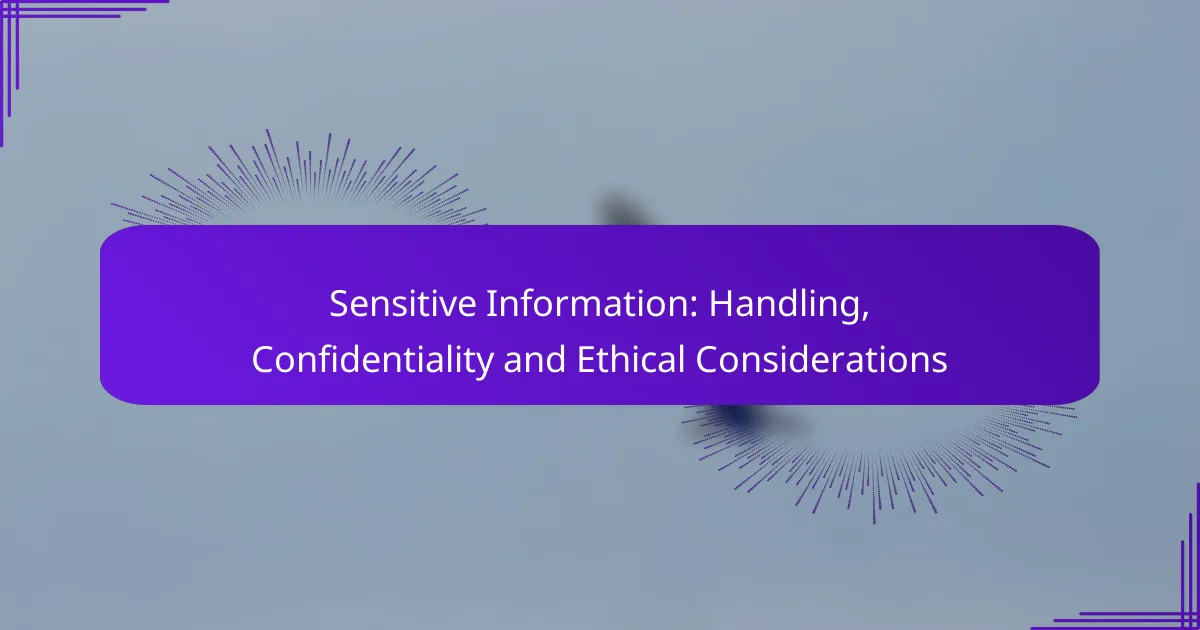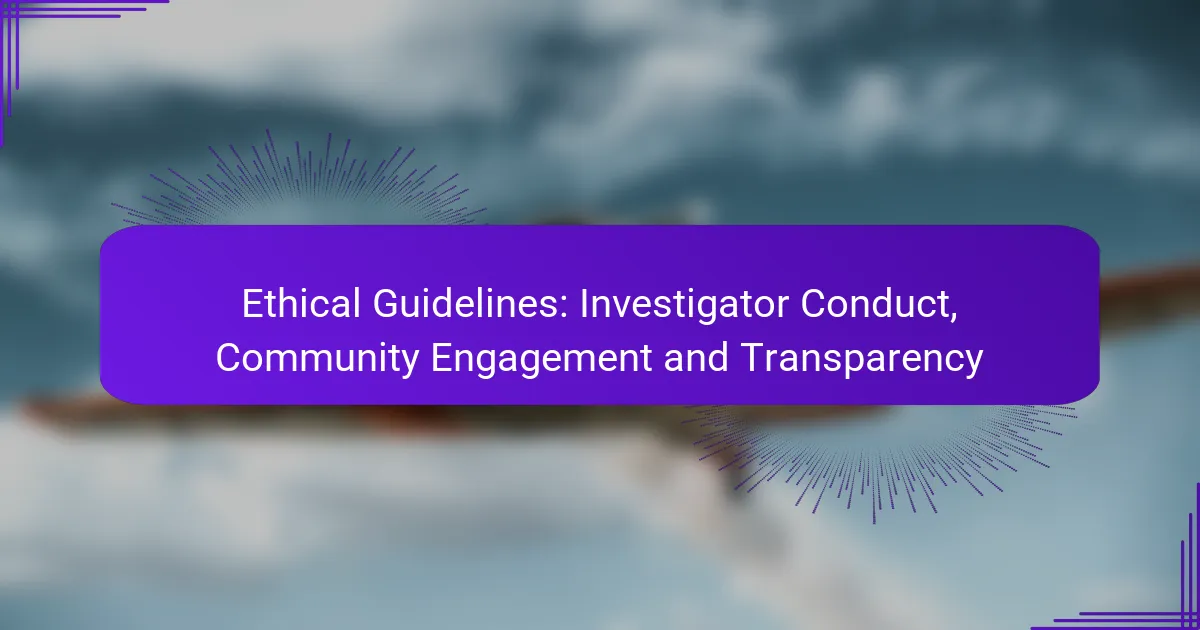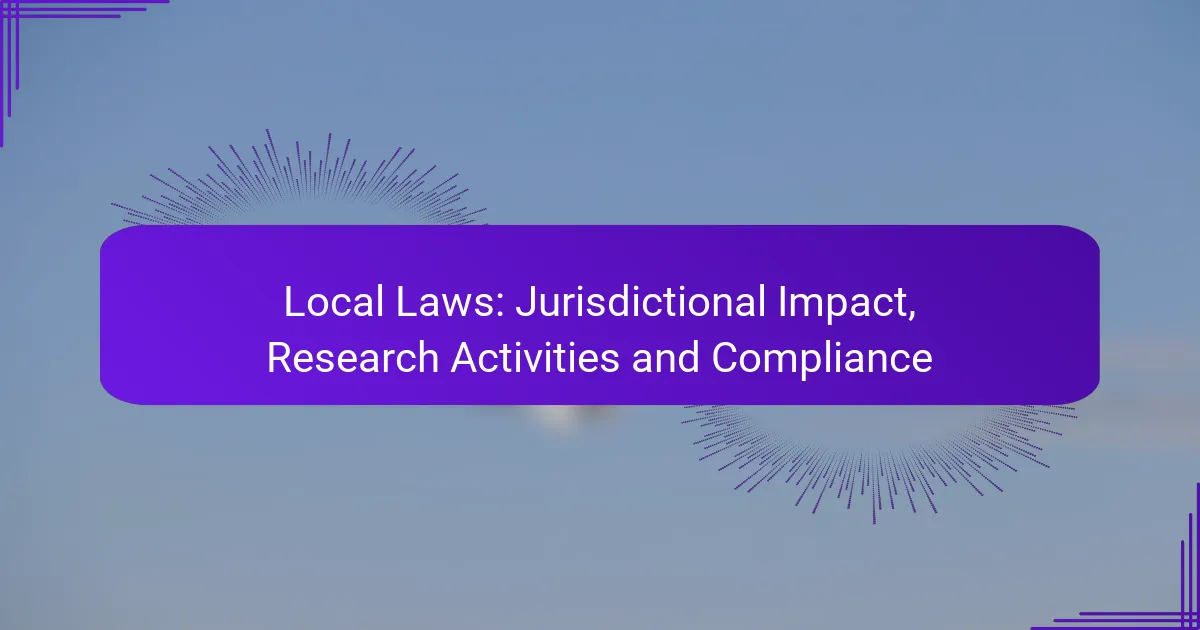Handling sensitive information requires stringent measures to ensure its security and confidentiality, protecting it from unauthorized access and breaches. Ethical considerations play a crucial role in this process, emphasizing the importance of individual privacy, informed consent, and responsible data collection practices. By adhering to legal frameworks, organizations can maintain trust while effectively safeguarding personal data.
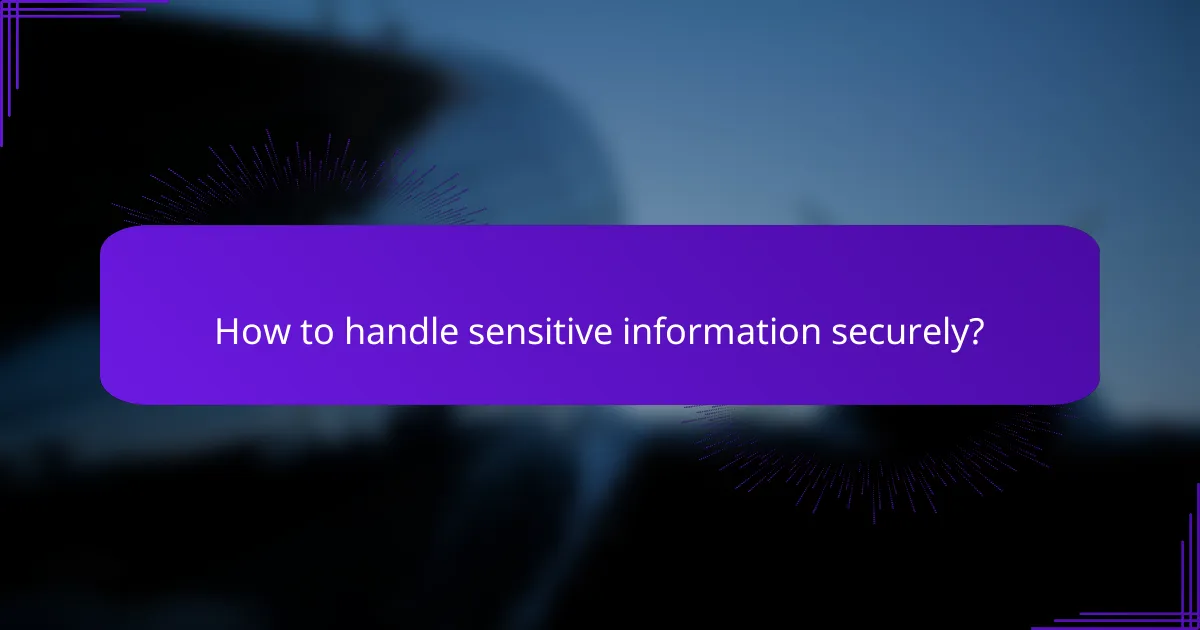
How to handle sensitive information securely?
Handling sensitive information securely involves implementing robust measures to protect data from unauthorized access and breaches. Key strategies include encryption, access controls, regular audits, employee training, and secure communication methods.
Implement encryption protocols
Encryption protocols convert sensitive information into a coded format that can only be accessed with the correct decryption key. This ensures that even if data is intercepted, it remains unreadable to unauthorized parties.
Common encryption standards include AES (Advanced Encryption Standard) and RSA (Rivest-Shamir-Adleman). Organizations should use strong encryption methods for data at rest and in transit to enhance security.
Establish access controls
Access controls limit who can view or manipulate sensitive information based on their role within the organization. Implementing role-based access control (RBAC) helps ensure that only authorized personnel can access critical data.
Regularly review access permissions to adjust for personnel changes and ensure compliance with internal policies. This practice minimizes the risk of data exposure due to unnecessary access rights.
Conduct regular audits
Regular audits assess the effectiveness of security measures in place for handling sensitive information. These audits should evaluate compliance with established policies and identify potential vulnerabilities.
Consider conducting audits at least annually or more frequently if there are significant changes in operations or regulations. Utilize third-party auditors for an unbiased evaluation of your security practices.
Train employees on best practices
Employee training is crucial for maintaining data security. Staff should be educated on recognizing phishing attempts, using strong passwords, and understanding the importance of confidentiality.
Regular training sessions and updates on security protocols can significantly reduce the risk of human error leading to data breaches. Incorporate real-world scenarios to enhance understanding and retention of best practices.
Utilize secure communication channels
Secure communication channels protect sensitive information during transmission. Use encrypted email services and secure file transfer protocols (SFTP) to safeguard data shared between parties.
Encourage the use of virtual private networks (VPNs) for remote access to company resources, ensuring that data remains protected from interception over public networks.
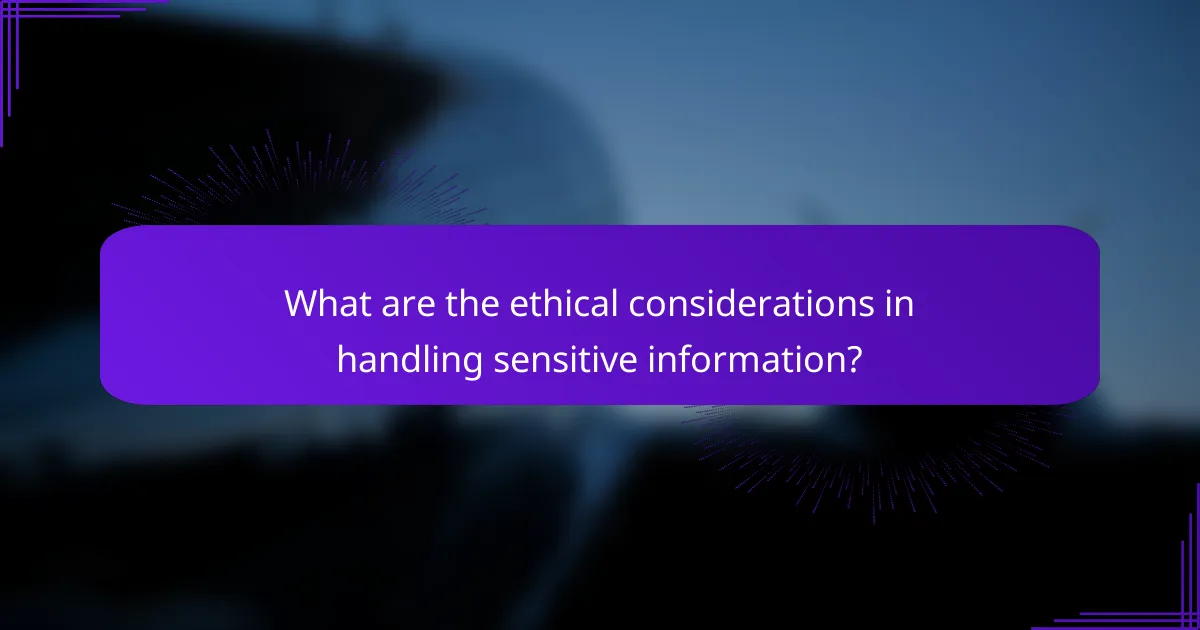
What are the ethical considerations in handling sensitive information?
Ethical considerations in handling sensitive information revolve around protecting individual privacy, ensuring informed consent, and minimizing data collection. These principles help maintain trust and comply with legal standards while safeguarding personal data.
Respect user privacy
Respecting user privacy means prioritizing the confidentiality of personal information. Organizations should implement robust security measures to protect data from unauthorized access and breaches. For example, using encryption and secure servers can significantly reduce the risk of data exposure.
Additionally, transparency about data usage is crucial. Users should be informed about what data is collected, how it is used, and who has access to it. This builds trust and encourages users to engage with the organization confidently.
Obtain informed consent
Obtaining informed consent involves clearly communicating to users what data will be collected and for what purposes. Consent should be explicit, meaning users actively agree to the terms rather than being assumed to consent by default. This can be achieved through straightforward consent forms that outline data practices.
It is essential to allow users to withdraw their consent easily at any time. This empowers individuals and reinforces their control over their personal information, aligning with ethical standards and regulations like GDPR in Europe.
Ensure data minimization
Data minimization is the practice of collecting only the information necessary for a specific purpose. This reduces the risk of misuse and enhances user privacy. For instance, if a service only requires an email address for account creation, it should not ask for additional personal details unnecessarily.
Organizations should regularly review their data collection practices to ensure compliance with this principle. Implementing policies that limit data retention periods can further support data minimization, ensuring that information is not kept longer than needed.
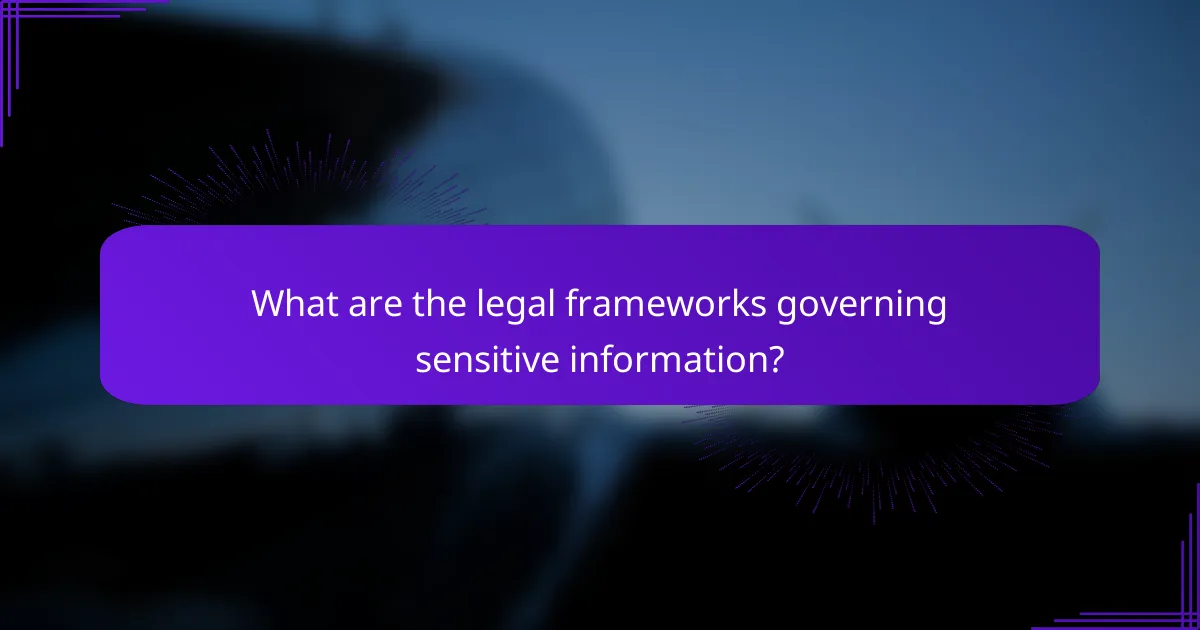
What are the legal frameworks governing sensitive information?
Legal frameworks for sensitive information establish guidelines for how personal data should be collected, processed, and protected. These regulations aim to safeguard individual privacy and ensure responsible handling of sensitive data across various sectors.
General Data Protection Regulation (GDPR)
The General Data Protection Regulation (GDPR) is a comprehensive data protection law in the European Union that governs the processing of personal data. It emphasizes the importance of obtaining explicit consent from individuals before collecting their data and mandates that organizations implement adequate security measures to protect this information.
Under GDPR, individuals have rights such as access to their data, the right to rectify inaccuracies, and the right to erasure, commonly known as the “right to be forgotten.” Organizations must be transparent about their data practices and can face significant fines for non-compliance, often reaching up to 4% of annual global revenue.
Health Insurance Portability and Accountability Act (HIPAA)
The Health Insurance Portability and Accountability Act (HIPAA) is a U.S. law that sets standards for the protection of health information. It applies to healthcare providers, insurers, and any entity that handles protected health information (PHI), ensuring that patient data is kept confidential and secure.
HIPAA requires covered entities to implement administrative, physical, and technical safeguards to protect PHI. Violations can result in substantial penalties, ranging from thousands to millions of dollars, depending on the severity of the breach and the level of negligence involved.
California Consumer Privacy Act (CCPA)
The California Consumer Privacy Act (CCPA) is a state law that enhances privacy rights for California residents. It grants individuals the right to know what personal data is being collected about them, the ability to request deletion of their data, and the option to opt out of the sale of their information.
Businesses subject to CCPA must provide clear disclosures about their data practices and comply with consumer requests regarding their personal information. Non-compliance can lead to fines and legal action, making it crucial for organizations operating in California to understand and adhere to these regulations.
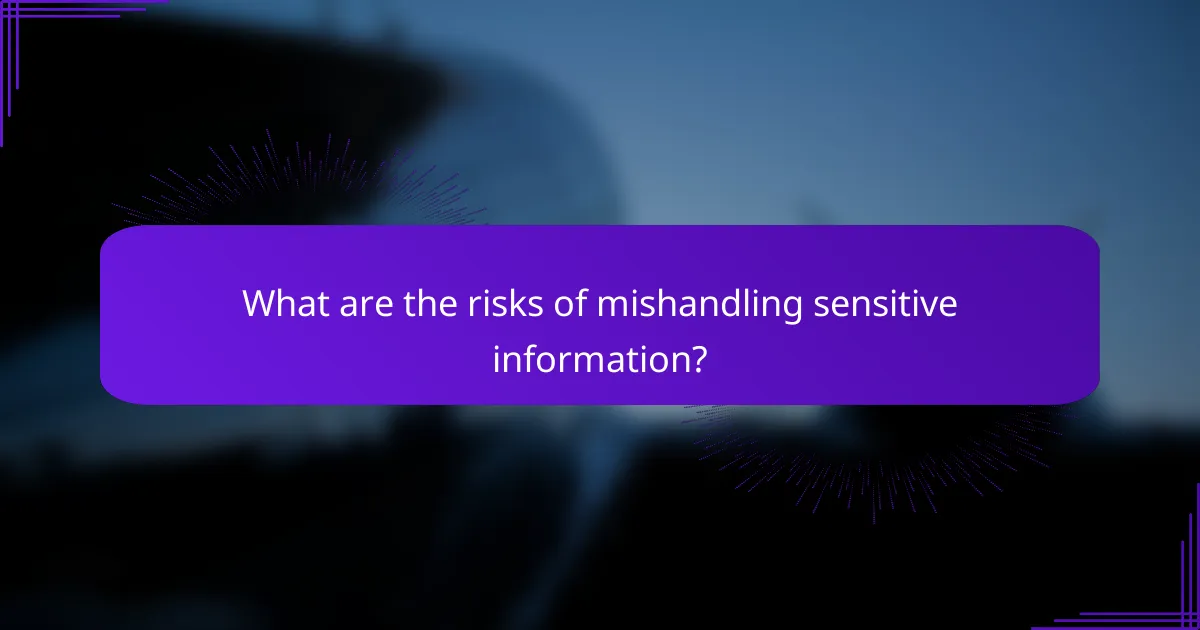
What are the risks of mishandling sensitive information?
Mishandling sensitive information can lead to significant risks, including data breaches, legal penalties, and damage to reputation. Organizations must prioritize the protection of confidential data to mitigate these threats and maintain trust with stakeholders.
Data breaches
Data breaches occur when unauthorized individuals gain access to sensitive information, often resulting from inadequate security measures. These breaches can expose personal data, financial records, and proprietary information, leading to severe consequences for individuals and organizations alike.
To prevent data breaches, implement robust security protocols such as encryption, regular software updates, and employee training on data protection. Regular audits can help identify vulnerabilities before they are exploited.
Legal penalties
Mishandling sensitive information can result in substantial legal penalties, particularly if organizations fail to comply with data protection regulations such as GDPR or HIPAA. Fines can range from thousands to millions of dollars, depending on the severity of the violation.
Organizations should establish clear data handling policies and conduct regular compliance training to avoid legal repercussions. Consulting with legal experts can also ensure adherence to relevant laws and regulations.
Reputation damage
Reputation damage is a significant risk associated with mishandling sensitive information. Once trust is lost due to a data breach or legal issue, it can take years to rebuild, affecting customer loyalty and business relationships.
To protect reputation, organizations should proactively communicate their data protection efforts and respond transparently to any incidents. Building a culture of security awareness among employees can also help prevent mishandling of sensitive information.

How to create a confidentiality policy?
Creating a confidentiality policy involves outlining how sensitive information is handled, ensuring employee compliance, and establishing clear reporting procedures. A well-defined policy protects both the organization and its stakeholders from potential data breaches and ethical violations.
Define sensitive information
Sensitive information includes any data that, if disclosed, could harm individuals or the organization. This can encompass personal identification details, financial records, trade secrets, and proprietary information. Understanding what qualifies as sensitive is crucial for effective policy development.
Examples of sensitive information include Social Security numbers, credit card details, medical records, and confidential business strategies. Organizations should regularly review and update their definitions to adapt to changing regulations and emerging threats.
Outline employee responsibilities
Employees play a vital role in maintaining confidentiality. They must understand their responsibilities regarding the handling, storage, and sharing of sensitive information. This includes adhering to access controls and using secure methods for communication and data transfer.
Training sessions should be conducted to inform employees about their obligations and the consequences of non-compliance. Regular reminders and updates can help reinforce these responsibilities and ensure that everyone remains vigilant in protecting sensitive data.
Establish reporting procedures
Clear reporting procedures are essential for addressing potential breaches of confidentiality. Employees should know how to report incidents or suspicious activities promptly and confidentially. This can involve a designated point of contact or a secure online reporting system.
Organizations should encourage a culture of transparency where employees feel safe to report issues without fear of retaliation. Regular reviews of the reporting process can help identify areas for improvement and ensure that the procedures remain effective and accessible.
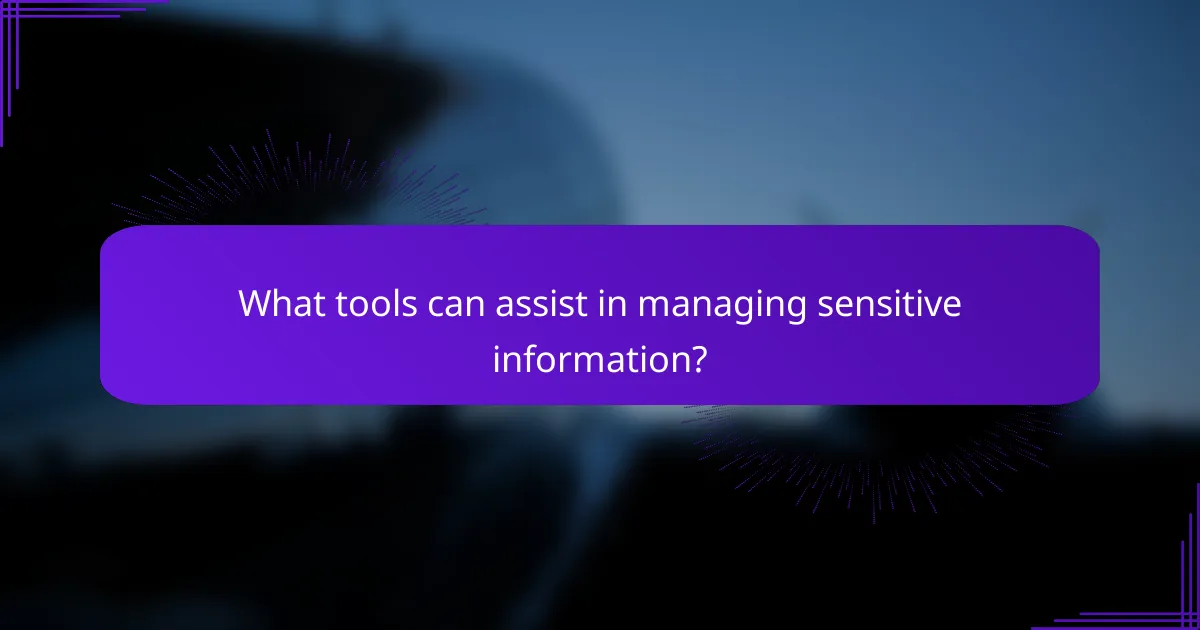
What tools can assist in managing sensitive information?
Various tools can help manage sensitive information effectively, ensuring confidentiality and compliance with regulations. These tools range from encryption software to secure communication platforms, each serving specific needs in protecting sensitive data.
Encryption Software
Encryption software is essential for safeguarding sensitive information by converting it into a coded format that can only be accessed with the correct decryption key. Popular options include AES (Advanced Encryption Standard) and RSA (Rivest-Shamir-Adleman), which are widely recognized for their security strength.
When selecting encryption tools, consider factors such as ease of use, compatibility with existing systems, and compliance with regulations like GDPR or HIPAA. Regularly updating encryption protocols is crucial to counter emerging threats.
Secure Communication Platforms
Secure communication platforms facilitate safe exchanges of sensitive information through encrypted messaging and voice calls. Tools like Signal and WhatsApp offer end-to-end encryption, ensuring that only intended recipients can access the content.
When using these platforms, be aware of their privacy policies and data retention practices. Opt for services that prioritize user privacy and provide transparency regarding data handling.
Data Loss Prevention (DLP) Solutions
Data Loss Prevention (DLP) solutions help organizations monitor and protect sensitive information from unauthorized access or leaks. These tools can identify, classify, and control data across various environments, including cloud storage and on-premises systems.
Implementing DLP solutions requires careful planning to define what constitutes sensitive information and establish appropriate policies. Regular audits and updates are necessary to adapt to changing data protection needs.
Access Control Systems
Access control systems regulate who can view or use sensitive information within an organization. Role-based access control (RBAC) is a common approach, allowing permissions based on user roles and responsibilities.
To enhance security, regularly review access permissions and ensure that only authorized personnel have access to sensitive data. Implementing multi-factor authentication can further strengthen access control measures.
